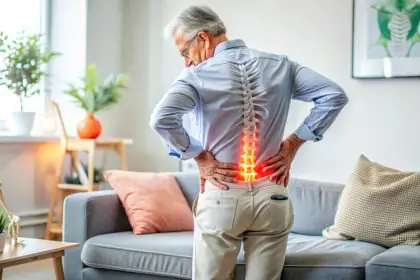Chronic pain refers to persistent or recurring pain that lasts for an extended period, typically lasting for more than three to six months.
It can result from various underlying conditions, such as arthritis, fibromyalgia, nerve damage, or injury.
Unlike acute pain that serves as a warning sign of injury or illness, chronic pain can persist even after the initial cause has healed.
Chronic pain is a complex condition that can be debilitating and have a significant impact on a person’s physical, emotional, and social well-being.
It can interfere with daily activities, sleep, mood, and overall quality of life.
Management of chronic pain often involves a multidisciplinary approach, including medical intervention, physical therapy, psychological support, lifestyle modifications, and complementary therapies.
Chronic Pain and Mental Health
chronic pain can have a significant impact on mental health.
Here’s how chronic pain can affect mental well-being:
Emotional distress
Living with persistent pain can lead to frustration, irritability, anxiety, and depression.
The daily struggle with pain, limitations in activities, and the impact on relationships can contribute to emotional distress.
Sleep disturbances
Chronic pain often disrupts sleep patterns, leading to insomnia or poor sleep quality.
Sleep deprivation can further worsen mood, increase fatigue, and hinder the ability to cope with pain.
Social isolation
Chronic pain can make it challenging to engage in social activities, leading to feelings of isolation and reduced social interactions.
This isolation can contribute to feelings of loneliness and negatively impact mental health.
Reduced quality of life
The limitations imposed by chronic pain can affect various aspects of life, such as work, relationships, and hobbies.
This reduction in quality of life can lead to feelings of disappointment, sadness, and a sense of loss.
Increased risk of mental health disorders
Studies have shown that individuals with chronic pain are at a higher risk of developing mental health conditions, such as depression and anxiety.
The constant experience of pain and the resulting impact on daily life can contribute to the development or worsening of these conditions.
It’s crucial for individuals with chronic pain to address their mental health as part of their overall pain management.
Seeking support from healthcare professionals, including psychologists or therapists, can help individuals develop coping strategies, manage emotional distress, and improve their overall well-being.
Looking for signs
It can be helpful to look for signs and symptoms that may indicate the impact of chronic pain on your mental health. Here are some common indicators:
- Mood changes: You may experience persistent feelings of sadness, irritability, or hopelessness.
- Anxiety and worry: You may feel anxious, restless, or constantly worry about your pain, its impact on your life, or the future.
- Sleep disturbances: Chronic pain can disrupt your sleep patterns, leading to insomnia, difficulty falling asleep, or frequent awakenings.
- Fatigue and lack of energy: The constant experience of pain and its effects can leave you feeling exhausted and lacking energy to engage in daily activities.
- Social withdrawal and isolation: Chronic pain may limit your ability to participate in social activities or events, leading to a reduced desire to engage socially and increasing feelings of isolation.
- Poor concentration and memory issues: Pain and associated discomfort can make it challenging to focus, concentrate, and remember things.
- Loss of interest or pleasure: Chronic pain may lead to a decreased interest in activities or hobbies you previously enjoyed and a reduced overall sense of pleasure.
7 Tips for managing Chronic Pain and Mental Health
Here are seven tips for managing chronic pain and promoting mental health:
Seek professional help
Consult a healthcare professional or pain management specialist who can create a personalized treatment plan tailored to your specific needs.
They may recommend a combination of medication, therapy, or alternative treatments.
Practice stress management techniques
Chronic pain can cause stress and vice versa.
Engaging in stress-reducing activities such as deep breathing exercises, meditation, mindfulness, or yoga can help alleviate both physical and mental discomfort.
Stay connected
Chronic pain can be isolating, so it’s crucial to stay socially connected with friends, family, or support groups.
Sharing your experiences, seeking understanding, and receiving emotional support can significantly impact your mental well-being.
Engage in regular exercise
Consult with your healthcare professional or physical therapist to determine appropriate exercises for your condition.
Physical activity, even gentle movements, can help improve mood, release endorphins, decrease pain sensitivity, and increase strength and flexibility.
Practice good sleep hygiene
Establish a consistent sleep routine, aiming for the recommended seven to nine hours per night.
Create a conducive sleep environment, limit caffeine and electronic device use before bed, and consider relaxation techniques to improve sleep quality.
Incorporate relaxation techniques
Stress and pain can create tension in the body.
Techniques such as progressive muscle relaxation, guided imagery, or aromatherapy can help promote relaxation, reduce anxiety, and manage chronic pain symptoms.
Prioritize self-care
Make time for activities that bring you joy and relaxation. Engage in hobbies, engage in creative outlets, practice self-compassion, and set realistic goals to ensure you are taking care of your overall well-being.
Remember, it is essential to consult and work closely with healthcare professionals to create a comprehensive approach to managing chronic pain and mental health.
Each individual may have unique circumstances, so finding the right combination of strategies and treatments may require some experimentation and adjustments.
Extra Tips for Your mental health
Taking care of your mental health is crucial for overall well-being.
Here are some tips to help you maintain good mental health:
Practice Self-Awareness
Self-awareness is the foundation of good mental health. It involves recognizing and understanding your emotions, thoughts, and reactions.
Keep a journal to track your feelings and identify any patterns or triggers.
Pay attention to physical cues like muscle tension, stomach discomfort, or headaches, as these can be signs of stress or emotional distress.
Maintain a Support System
Your support system can include friends, family, or even support groups.
Cultivate open and honest communication with them. Sharing your thoughts and feelings can be incredibly therapeutic.
Don’t hesitate to seek professional help from a therapist or counselor if needed.
Exercise Regularly
Aim for a mix of aerobic, strength, and flexibility exercises.
Exercise helps release endorphins, which can reduce symptoms of anxiety and depression.
Find physical activities you enjoy, whether it’s jogging, yoga, dancing, or team sports.
Eat a Balanced Diet
Include a variety of foods rich in nutrients like fruits, vegetables, lean proteins, and whole grains.
Omega-3 fatty acids, found in fish and walnuts, may have mood-enhancing effects.
Limit or avoid excessive caffeine, sugar, and processed foods, as they can lead to mood swings.
Get Enough Sleep
Create a sleep-friendly environment by keeping your bedroom dark, quiet, and at a comfortable temperature.
Establish a regular sleep schedule, going to bed and waking up at the same times every day.
Avoid stimulating activities (like screen time) before bedtime, as they can interfere with sleep.
Manage Stress
Practice relaxation techniques, such as deep breathing, progressive muscle relaxation, or mindfulness meditation.
Identify the sources of stress in your life and develop strategies to address them. This may involve time management, setting boundaries, or seeking support.
Set Realistic Goals
Break down larger goals into smaller, manageable tasks. This can make them less overwhelming.
Celebrate your achievements, no matter how small, to boost your self-esteem and motivation.
Mindfulness and Meditation
Mindfulness involves being fully present in the moment without judgment. You can practice it during everyday activities, such as eating or walking.
Meditation can help you relax and gain better control over your thoughts and emotions. Consider using apps or guided sessions to get started.
Limit social media and Screen Time
Set time limits for your screen usage, especially on social media.
Engage in other activities that allow you to disconnect and enjoy the real world, like going for a walk, reading a book, or pursuing a hobby.
Seek Professional Help
If you’re struggling with persistent mental health issues, such as anxiety or depression, don’t hesitate to consult a mental health professional.
Therapy can provide you with the tools to manage your mental health effectively and offer a safe space to discuss your concerns.
Engage in Hobbies and Activities
Find activities you’re passionate about and allocate time for them in your schedule.
Engaging in hobbies can provide a sense of purpose, reduce stress, and promote creativity.
Stay Connected
Loneliness can negatively impact mental health. Stay in touch with friends and family through calls, video chats, or social gatherings.
If in-person interaction isn’t possible, consider joining online communities or forums that align with your interests.
Practice Gratitude
Regularly write down or verbally express the things you’re grateful for.
Cultivating a positive perspective can help shift your focus away from negative thoughts and improve your overall well-being.
Limit Alcohol and Substance Use
If you find yourself using alcohol or drugs as a coping mechanism, it’s important to seek help from a substance abuse specialist.
Substance use can exacerbate mental health issues and lead to addiction.
Know When to Say No
Setting boundaries and saying “no” when you’re feeling overwhelmed is a sign of self-respect and self-care.
It’s essential to prioritize your own well-being and not overcommit.
Learn to Forgive Yourself
Understand that making mistakes and experiencing setbacks is a part of life.
Be kind and compassionate toward yourself, just as you would to a friend.
Educate Yourself
Learn about common mental health issues and available resources for support.
Knowledge can reduce the stigma surrounding mental health and empower you to make informed decisions about your well-being.
Stay Active and Engaged
Keep your mind occupied with activities and tasks you enjoy.
Boredom and inactivity can contribute to negative thought patterns and feelings of restlessness.
Remember that taking care of your mental health is an ongoing process.
It’s important to tailor these tips to your individual needs and preferences.
You don’t have to implement all of them at once, but gradually incorporating these practices into your daily life can significantly improve your mental well-being.
If you’re experiencing severe or persistent mental health issues, consult a mental health professional for personalized guidance and support.
Conclusion
Chronic pain and mental health are intricately interconnected, with each significantly impacting the other.
Living with chronic pain can lead to various mental health challenges such as anxiety, depression, and decreased quality of life.
Conversely, mental health conditions can exacerbate the experience of chronic pain.
Understanding this relationship is crucial for comprehensive and effective treatment.
Integrating approaches that address both physical and mental aspects of chronic pain, such as pain management techniques, therapy, medication, and self-care, can improve overall well-being and enhance quality of life.
It is important for individuals experiencing chronic pain and mental health issues to seek professional help and support.
Collaborating with healthcare professionals can lead to personalized treatment plans that address both the physical and emotional aspects of their condition.
Combining medical support with self-care practices, engaging in healthy coping mechanisms, and building a support network can provide individuals with the tools and resilience to navigate the challenges associated with chronic pain and mental health, ultimately promoting a better overall quality of life.
FAQs
Can chronic pain affect mental health?
Yes, chronic pain can significantly impact mental health, leading to emotional distress, sleep disturbances, social isolation, and an increased risk of mental health disorders.
How does chronic pain affect mood?
Chronic pain can lead to mood changes such as sadness, irritability, and feelings of hopelessness.
Does chronic pain contribute to anxiety?
Yes, chronic pain can contribute to anxiety symptoms, including restlessness and constant worrying.
Can chronic pain disrupt sleep patterns?
Yes, chronic pain often disrupts sleep, leading to insomnia or poor sleep quality.
Does chronic pain cause social withdrawal?
Yes, chronic pain can limit participation in social activities, leading to social withdrawal and feelings of isolation.
Can chronic pain affect concentration and memory?
Yes, chronic pain can make it difficult to concentrate, focus, and remember things.
Is there a connection between chronic pain and loss of interest?
Yes, chronic pain can diminish interest in previously enjoyed activities and reduce overall pleasure.
When should I seek professional help for chronic pain’s impact on mental health?
If symptoms like mood changes, anxiety, sleep disturbances, or social withdrawal persist and significantly impact daily life, it’s important to seek professional help for appropriate support and management strategies.





